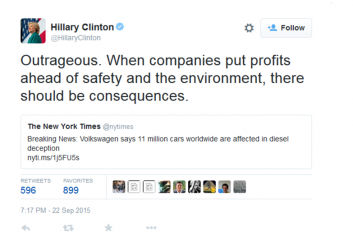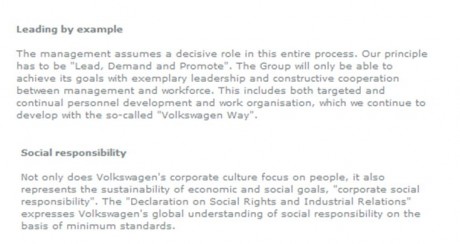Could your boardroom ethics cost you £20bn?
5 October 2015 By Northern Lights
For too long, the issue of ethics in the boardroom has been seen as rather fluffy or for the CSR department and not about core business.
But in the last few weeks we have seen just what the cost can be.
Martin Winterkorn, chief executive of the world’s second-largest carmaker VW, has stepped down as the scale of the emissions scandal wiped nearly 26 billion euros ($29 billion) off its market value overnight.
So what are the issues here and what can we learn from the sorry story?
I was interested that Hillary Clinton tweeted: “Outrageous. When companies put profits ahead of safety and the environment, there should be consequences.”
Now we all know that tweets are not crafted essays, and condensing your key point into 140 characters at speed means it is easy to leave out something critical. However, my own reaction to Clinton’s tweet was that while safety and the environment are really important, the biggest issue was fundamental, known dishonesty. Selling customers something that you knew was blatantly packaged to look good and wasn’t.
In a statement issued by the company Winterkorn said he was “shocked by the events of the past few days. Above all, I am stunned that misconduct on such a scale was possible in the Volkswagen Group.”
Who believes that? It’s amazing how quickly the rock solid reputation of a company can disappear in minutes?
In the States, the VW head, Michael Horn had admitted far more directly that the company ‘screwed up’.
- What were the issues at VW?
We had a discussion in our office iabout the VW fiasco and I asked my colleagues why they thought VW bosses had done this. Immediately they said “greed”. No-one believes Winterkorn’s protestations of innocence.
Major corporates now pay their top bosses what are eye-watering sums for most people – and certainly most of their employees. The Telegraph says Winterkorn was “one of Europe’s highest-paid chief executives with total annual remuneration of €16.8m (£12.3m) last year … and could depart with a payout of more than €30m (£22m).”
What leads a solid German car manufacturer to take part in such wholesale dishonesty? And if the chief executive says he knew nothing, you have to question which was the worst sin – doing it or not knowing being in charge of what was happening in the business?
Here are a few thoughts as to how the problem could have started – and then below what we all need to learn from these
- The benefits far outweighed the risks. Apparently the costs of complying with the US laws would have cost £1500 per car. The options for VW – and other car manufacturers? – were complex. You can imagine the discussions, “are diesel cars viable any more?”, “will consumers pay the additional price?”, “will we be seen as not caring for the environment if we drop diesel altogether?”Fixing a bit of software clearly seemed the easier ‘out’
- There was potential for loss of face, to say nothing of loss of profit
- The loss of profit would affect pay packets at the top
- Clearly this issue went way beyond just VW. Bosch apparently warned VW about the software four years ago. It seems inconceivable that the board didn’t know. With these pay levels, I always worry that directors have become isolated from ‘real life’ and kid each other in their ivory towers that this behaviour is acceptable. Did they have enough people around them who would challenge them?
- There has been a deafening silence from other car manufacturers – most people are waiting to hear that others are implicated too. Is there collusion on a massive scale?
- How do corporates ensure honesty at the top?
Over the years I have helped many organisations with their internal communications – creating a culture of honesty is typically part of the objectives and messages.
But I have been really challenged in thinking how do you ensure honesty in a company when the board is the problem? Culture has to be led by example and from the top. Here is what I have come up with – and yes, it is extremely difficult
- It is the investors who have lost out on this. Winterkorn may eventually go to jail – and many doubt he will – but for now he has a £22 million payout. Investors have lost a third of what they had. We need to find a better way for investors to understand and challenge boards – the large pension funds send tick box sheets to collect information on ‘ethics’ but I can’t see what the point of that is?! Is it time for investors to have a seat on a board?
- Is it time for the whole issue of pay at the top to be revisited? It was headhunters who pushed pay up around the world – their fees are related to pay levels so it was in their interests to do this. Being paid £12m a year without risk (I say no risk because they didn’t invest their own money) must give directors an exalted view of their worth and ability? I am sure it makes them remote from their own business and the top tier all kid themselves that this ‘fix’ was acceptable behaviour
- Diversity on boards. Whether this is by gender, age, background – when you look at the current VW board (see the photo below) the old phrase about ‘old boys’ club’ comes to mind. And the problem with having similar backgrounds is you often miss out on people who aren’t afraid to ask the silly question or are fearless in challenging or digging when something doesn’t ‘smell right’.
- Values and culture are meaningless
There is a lesson for us all in here. Have a look at VW’s ‘basic principles’ – their values.
It just shows that if you don’t have real belief and example at the top, then all your values are completely meaningless. Words mean little. It is what you see every day in how your leaders live the values, that create ‘culture’.
The so-called ‘Volkswagen Way’ could take on a whole new meaning.
How do we overcome this arrogance and dishonesty at the top? We keep seeing it – from the mis-selling in banks to Tesco’s accounting ‘overstatement’ to Toshiba’s £780m accounting scandal – but we fail to find answers that work.
I started this blog knowing exactly what I was going to write. I have done loads around boards, board ethics, culture and ensuring honesty. But normally we work with a chief executive who has a clear vision and wants help to put it into place. However it is much more challenging to ensure honesty when there isn’t the initial leadership behind it.
I wrote a six-point crisis action plan for Barclays and other banks just before Bob Diamond stepped down. That would have worked because it is such a heavily regulated industry and I was looking at the crisis comms aspect; looking at how a culture develops and what you do about it is very different.
What needs to change in our boardrooms; what would you do?




